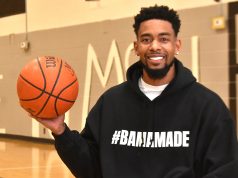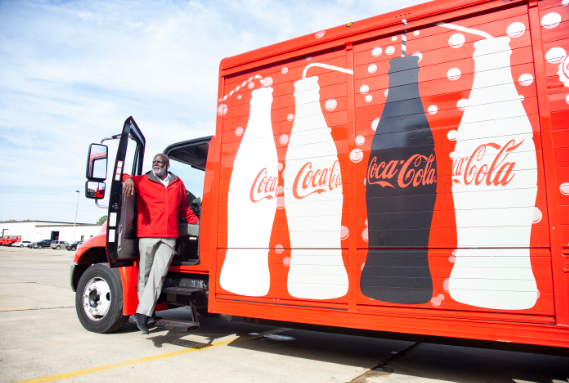
By Erica Wright
The Birmingham Times
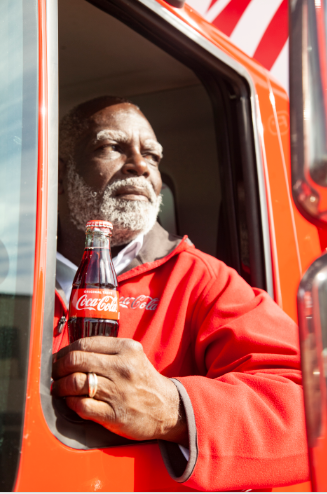
More than four decades ago, Walter Body stepped into Birmingham-based Coca-Cola Bottling Co. UNITED as a teenage boy in need of a summer job. Now, he prepares to leave the company as a man who has broken down barriers and made an impact.
Body, 62, who has spent more than half of his life as a Coca-Cola employee will be retiring after 42 years of service—during which time he worked his way up from a summer helper on the delivery truck to sales center manager for the Birmingham Home Market Department to his current position, director of multicultural marketing and consumers.
Body said he has always looked for ways to make a difference throughout his career in what he called “progression moves.”
“For example, when I was area manager, a sales contest was going on: if you made your goal in sales, you had the opportunity to go get a tailored suit,” he said. “Well, a lot of those guys had tailored suits made, but I had a tailored tuxedo made. The company had begun to invite my wife and me to various functions that were always black-tie, so I had to turn down quite a few because I didn’t have a tuxedo. By getting that tuxedo made, I always had one.”
Body also helped the company grow across several markets.
“The company needed African-American representation, and I could always be that representation,” he said. “People began to know me, and I began to know the community. That kind of set it up for the company to grow in the community because I could then represent the company in so many different areas.”
As for what’s next, Body plans to work with his family at Falls Facility Services Inc.
On Tuesday, Birmingham Mayor Randall Woodfin and the City Council honored Body during the council meeting with a proclamation recognizing Body’s years of service at Coca-Cola United Birmingham and his extensive work in the community.
A Boy with a Dream
Growing up in Titusville with his mother and three siblings in a three-room shotgun house, Body had dreams of living atop Red Mountain.
“If you stand at Memorial Park, which is right in Titusville across from the city jail, you can see Red Mountain,” he said. “As a kid, I used to stand on the top of the steps at Memorial Park, and as I would look up at Red Mountain … I would say my goal was to someday live on Red Mountain because that’s where Mountain Brook is.”
Body’s mother was a single parent who worked in a laundromat, so she would often have to get Body and his siblings up early to take them to school or to his grandmother’s house before school.
“My grandmother, aunts, and uncles basically lived in the same part of town, so when you say it takes a village, we literally had a village,” he said.
Body attended Washington Elementary School. As a child with asthma, he couldn’t participate in a lot of sports and activities until he was much older.
“One night, I had an asthma attack. We didn’t have a family car, so one of my uncles had come up to the house, pick up my mom and me, and take us to [the University of Alabama at Birmingham (UAB) Hospital], which at that time it was Hillman Hospital,” Body recalled. “When we got there, the [staff] said, ‘He’s too young to be seen at Hillman because we now have the Children’s Hospital,’ [but] my uncle had already dropped us off.”
Body said his mother carried him four blocks to Children’s Hospital for treatment. After being treated for that asthma attack and an additional attack later, Body was sent for a battery of tests that revealed several allergies for which he received treatment.
“I was about 10 or 11 years old at the time, and [my mother] was able to treat me,” he said, “Then I got to the point where I could go outside and play, run, play football, run track, do all of that.”
Once Body got to A.H. Parker High School, he was able to join the track team. Track coach Fred Horn knew Body wanted to play football going into his senior year, so to keep some of the boys in shape, Horn got them several jobs at Coca-Cola. Body and his teammates worked as helpers, loading and unloading delivery trucks.
“That was our first summer, going into our senior year,” Body said. “The summer after I graduated from high school, I went back to work at Coca-Cola again. Then I went off to college and returned to [the company] the summer after my first year of college. At that point, I had moved up to where I could be a relief driver. Because the summer season was so heavy, I could help drive and deliver Coca-Cola products.”
Drive And Determination
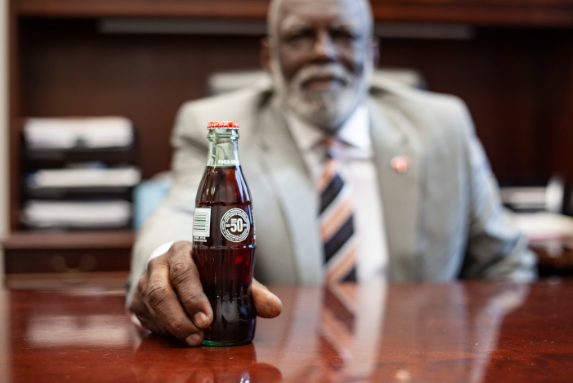
That first summer at Coca-Cola, Body needed a car, so he worked the entire summer to save enough to buy one.
“We had never owned a car in our family until then,” he said. “My mom and I went to the dealership and negotiated my first car—and she couldn’t even drive.
“I got down to two weeks before I was supposed to go back to school and needed $50 to finish the down payment. A white guy named Luther went into his pocket and gave me $50 and said, ‘Go get your car.’ This was in 1975, and I bought a 1972 Camaro.”
Body started out at Knoxville College in Knoxville, Tenn. In his sophomore year, he transferred to UAB, where he majored in electrical engineering. He ultimately earned a degree in business administration from Miles College in 1998.
While he was a student at UAB, Body continued working at Coca-Cola and applied for a different position, which he didn’t get. On his application, he listed one of his supervisors, William McDaniel, a sales manager, as a reference.
“[McDaniel] called me and said, ‘Walt, I see you’re looking for a job. I’ve got a job for you if you’re interested. I needed the job, and I took the job. That was in 1977, and that’s when I became full-time at Coca-Cola,” Body said.
Journey at Coca-Cola
As a full-time employee, Body started as a driver with his own route.
“I ran that route for a number of years,” he said. “Then I started moving up in the company. I went from getting my own route to becoming a relief salesman,” which entailed traveling to stores and preordering Coca-Cola products in various parts of town.
Eventually, a new position opened, leading to Body’s first managerial role: route sales manager.
“I was responsible for a specific area of town, and I had drivers and salesmen reporting to me,” he said. “I was the first African-American route salesman for Birmingham Coca-Cola; this was in the mid- to late-1980s. The significance of me being African-American and being the route manager was that the guys who reported to me were all male [and] were not African-American. In fact, I didn’t have a single African-American reporting to me. They were all much older, and it was in an area of town or in counties that weren’t quite as friendly to African-Americans.”
Some of Body’s employees were not pleased—some retired, transferred, or quit—but he received more support than opposition.
“I’ll never forget that when I took the territory over, there was one white guy, James Barnhill, who went into one of the establishments, a beer joint, where there were several good ol’ boys. He told them, ‘This is my route manager. He’s my boss. If you mess with him, you mess with me.’ That was it,” Body said.
Others showed support, as well.
“One of the stores, Piggly Wiggly in Homewood, was owned by an Italian family, and they were just good people,” Body said. “I’ve said before, ‘It takes a village.’ [My village] crosses multiple races and backgrounds even still today.”
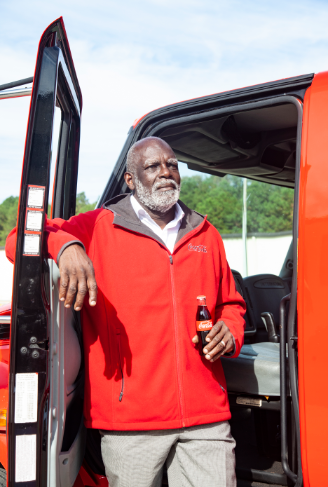
Eventually, he was promoted from route sales manager to large-store sales manager in the early 1990s and was responsible for the sales and distribution for all the Bruno’s, Winn Dixie, or any large grocery stores that needed big deliveries. Around that time, Body got to know current Coca-Cola Bottling Co. UNITED CEO John Sherman, who was the Birmingham sales manager at the time.
“We had an opportunity to change part of our marketing strategy here at Coke, where we’d always had some focus on the African-American consumers,” said Body. “We ramped up our focus on the African-American community, [which] was new to Coke United and a little new to the company, so to speak. I asked for that position to head up the African-American market.”
Body was named African-American market manager and served in that role from 1999 to 2001, when another manager, Bo Taylor, suggested that Body get back into sales and operations. Body was promoted to Birmingham sales manager in 2001, making him the first African-American in that position.
“I was responsible for the sales and distribution of our Birmingham plant,” he said. “I stayed in that role for about seven or eight years.”
Pay It Forward
In 2012, Coca-Cola Co. and Coca-Cola Bottling Co. UNITED added Birmingham as a diversity pilot program that focused on three areas, Body said—“Marketplace: How do consumers purchase our product? Workplace: How much diversity is there? Community: What does Coca-Cola Birmingham look like from a community standpoint?”
When Coca-Cola began to expand in 2013, Body said, “They expanded my role, and I became director of multicultural consumers and communities for the central region because we had expanded.”
In that position, he helped shape the company’s focus in multicultural and diverse communities, particularly among African-Americans and Latinos.
Another initiative Body has been instrumental with is Pay It Forward, a one-week internship for college students at Historically Black Colleges and Universities (HBCUs). The program celebrates the achievements of HBCU students and further supports their success.
A Look Back
Looking back on his career, Body said his ability to break down barriers gave others the ability to see that they too can achieve.
“I realized that people looked up to me, what I did in the community, my name, … so I was kind of under the microscope,” he said. “I saw it as an opportunity for me to reach back and help people in the same manner that I had been helped. Some looked like me, and some didn’t, so I saw it as a way to help. I couldn’t see color in my help, and I couldn’t let it have an influence on or be a barrier to my helping people. I had to be a manager for all people.”
Body credits his longevity to genuinely liking people and not listening to those who told him he couldn’t excel.
“I had people tell me not to work at Coke, stay in school, and keep working in engineering,” he said. “Eight of us started out, and out of those eight I’m the only one who came back the second and third years.”
When Body was ready to go off to college, he was supposed to go to the U.S. Military Academy at West Point, N.Y.
“That spring, I got a notice that I couldn’t go. It wasn’t because of academics or because I couldn’t pass the entrance exam; it was because I had asthma,” he said. “I had to figure out at that point how I was going to go to school because my mother couldn’t afford to pay for it. A friend of mine told me, ‘I’m going to Knoxville College,’ and he asked if I wanted to go. I had some teachers at Parker help me fill out the application because they knew I kept my grades up. They sent it off, and I got a scholarship and financial aid to go to school when people said I couldn’t go because I didn’t have any money.
“Don’t tell me what I can’t do,” Body said.
Living the Dream
He even realized his dream of living atop Red Mountain.
“I lived further down the mountain. I bought my first house in Irondale, which was down the mountain, but I bought my first house over the mountain,” Body said. “I grew up in a three-room house, and the first house I bought had six rooms, so I doubled what I had growing up.
“Later in life, I built a house that was a strictly Man Upstairs delivery. I was told I couldn’t build a house because … I had divorced and didn’t have the financial means, but a friend of mine said I could build a house if I wanted to. So, we prayed about it, my builder and my banker, too. I built my house over the mountain near Ross Bridge.”
Body has been married to his wife, Vanessa, for 12 years, and they have a blended family with four adult children: Dr. Candace Body Williams, Tiffany Turner, Courtney Turner, and Cory Body; he has one son-in-law, Randy, and one grandchild, Carsyn.
In addition to serving as vice president of the Birmingham Civil Rights Institute board of directors, Body has served on several boards and committees for a broad range of organizations, including the United Way of Central Alabama, the Central Alabama YMCA, the grant review committee for the Community Foundation, the Mental Health Association, and Dance Foundation. He also is a member of Omega Psi Phi Fraternity, Inc., and served as chairman of the organization’s international meeting in Birmingham.
Body is a member of Sixth Avenue Baptist Church and serves on the Deacon Board and has served chairman of the Trustee Board.
Updated on Dec. 1, 2018 at 3:14 a.m. to correct the degree Body earned from Miles College and the boards he has served on.


